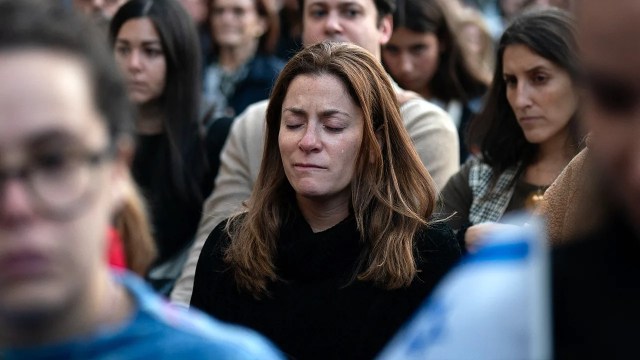
Related: How U.S. Muslims are experiencing the Israel-Hamas war
American Jews report feeling a host of emotions – including sadness, anger, exhaustion and fear – in reaction to the Oct. 7 Hamas attack on Israel and the ensuing Israeli invasion of Gaza. Nine-in-ten say they think discrimination against Jews has risen in the United States since the Israel-Hamas war began. And three-quarters say they have felt personally offended by something they’ve seen in the news or on social media about the war.
But not all Jewish Americans are experiencing the conflict the same way. The survey, conducted Feb. 13-25, finds that younger and older Jews often view the war differently, mirroring patterns in the broader U.S. public. In both groups, younger adults tend to express much more negative attitudes toward Israel than older Americans do. U.S. Jews also differ by age when it comes to the level of connection they feel with Israel, as we found in our 2020 survey of Jewish Americans.
Pew Research Center conducted this survey to explore Americans’ views on the Israel-Hamas war, including what role the United States should play in the conflict. We surveyed a total of 12,693 U.S. adults from Feb. 13 to 25, 2024. Most of the respondents (10,642) are members of Pew Research Center’s American Trends Panel, an online survey panel recruited through national random sampling of residential addresses, which gives nearly all U.S. adults a chance of selection.
The remaining 2,051 respondents are members of three other survey panels – Ipsos’ KnowledgePanel, SSRS’s Opinion Panel, and NORC at the University of Chicago’s AmeriSpeak Panel – who were interviewed because they identify as Jewish or Muslim.
We “oversampled” (i.e., interviewed a disproportionately large number of) Jews and Muslims to provide more reliable estimates of their views on the topics covered in this survey. But these groups are not overrepresented in the national estimates reported here, because we adjusted for the oversampling in the weighting of the data. The survey is weighted to be representative of the U.S. adult population by gender, race, ethnicity, partisan affiliation, education, religious affiliation and other categories. In total, 1,941 Jewish and 414 Muslim respondents participated in this survey.
While the sample design was identical for Jews and Muslims, the resulting sample sizes are different. There are two main reasons for this. The Jewish population in the United States is roughly double the size of the Muslim population. Consequently, national survey panels have roughly twice as many or more Jewish panelists as Muslim ones. In addition, decades of research on survey nonresponse has shown that some groups in the U.S. are more likely to participate in surveys than others. Generally speaking, Jewish adults are more likely to participate in surveys than Muslim adults.
The survey also included questions about where people were born and whether people identify as Arab or of Arab origin. Because of insufficient sample size, we are unable to analyze Arab Americans or Americans of Israeli or Palestinian descent separately.
In this survey, Jews and Muslims are defined as U.S. adults who answer a question about their current religion by saying they are Jewish or Muslim, respectively. Unlike our 2020 report on Jews in America, this report does not separately analyze the views of “Jews of no religion” (i.e., people who identify as Jewish culturally, ethnically or by family background but not by religion).
For more information on how we conducted this survey, refer to the ATP’s Methodology and the Methodology for this analysis. Here are the questions on views and knowledge of the Israel-Hamas war used in this analysis, and on perceptions of discrimination since the war began.
How and why the war is being fought
An overwhelming majority of Jewish American adults (93%) say that the way Hamas carried out its Oct. 7 attack was unacceptable.
But Jewish adults under 35 are divided over Israel’s military response: 52% say the way Israel has carried out the war has been acceptable, while 42% call it unacceptable, and 6% are unsure. Jews ages 50 and older are far more likely to say Israel’s conduct of the war has been acceptable (68%).
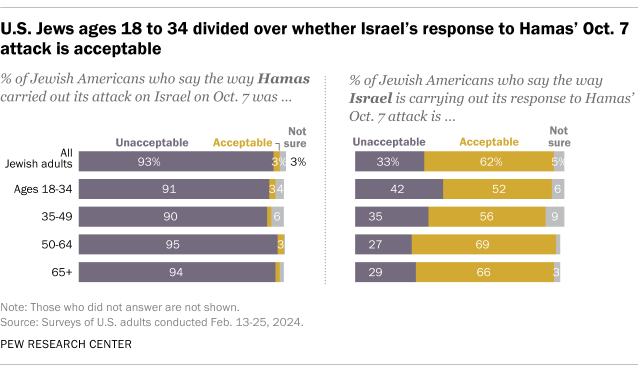
As for why the war is being fought in the first place, 77% of Jewish adults – including a majority in every age group – say Hamas’ reasons for fighting Israel are not valid. But Jewish adults under 35 are more likely than older Jews to say that Hamas’ reasons for fighting are valid: 31% of younger Jews take this position, compared with about one-in-ten of those ages 35 and older.
By comparison, 89% of Jewish Americans say Israel’s reasons for fighting Hamas are valid – far more than the 58% of all U.S. adults who say this. Younger Jews are less likely than their older counterparts to say Israel’s reasons for fighting Hamas are valid, though about eight-in-ten or more in every age group say this.
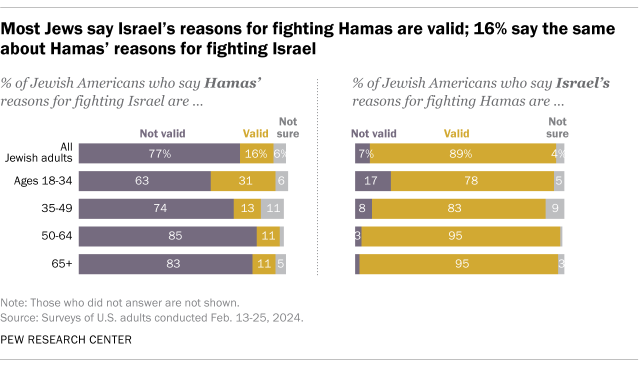
Views of the people and leadership involved in the war
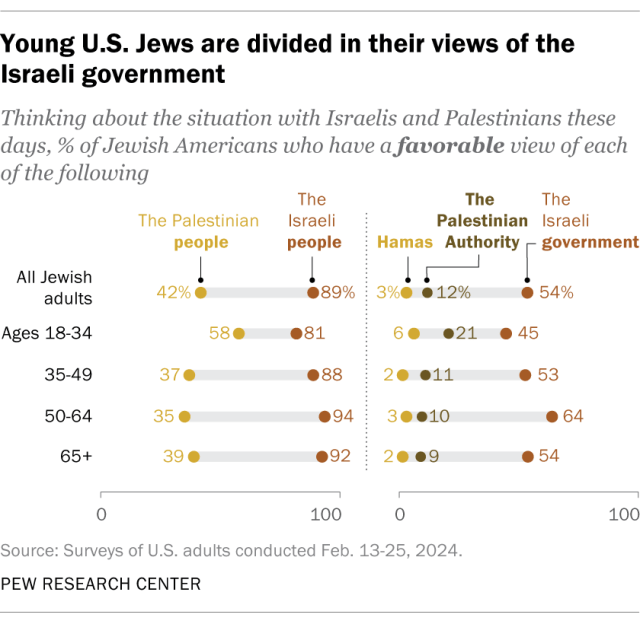
Around nine-in-ten U.S. Jews (89%) express a favorable view of the Israeli people, and 54% have a favorable view of the Israeli government. Jews are far more likely than the broader U.S. public to have a favorable view of the Israeli people (89% vs. 64%) and are also more likely than Americans overall to express a favorable opinion of Israel’s government (54% vs. 41%).
Four-in-ten American Jews have a favorable view of the Palestinian people – somewhat lower than the 50% of Americans overall who say the same. Very few Jewish Americans have a favorable opinion of Hamas, which has controlled Gaza, or the Palestinian Authority, which controls the West Bank (3% and 12%, respectively).
Jewish Americans are divided by party in their views of the Israeli government. Jews who identify as Republicans or lean toward the Republican Party are about twice as likely as Jews who identify as Democrats or lean Democratic to say they have a favorable view of the Israeli government (85% vs. 41%). (Among Jews, 68% identify with or lean toward the Democratic Party and 29% identify with or lean toward the Republican Party.) On the other hand, Jewish Democrats are more likely than Jewish Republicans to say they have a favorable view of the Palestinian people (52% vs. 20%) and the Palestinian Authority (14% vs. 9%).
Jewish Americans also differ by age in their views of the people and leadership involved in the conflict. Compared with older U.S. Jews, younger Jews express less favorable attitudes toward the Israeli people and more favorable views of the Palestinian people. Younger Jews also hold somewhat more positive views of the Palestinian Authority.
When it comes to the Israeli government, there are age differences among Jewish Americans, as there are among American overall. For example, 45% of Jews under 35 have a favorable view of the Israeli government, while 53% have an unfavorable view. Jews ages 50 to 64 are the only age group in which a majority express a favorable opinion of the Israeli government (64%).
What role should the U.S. play in the conflict?
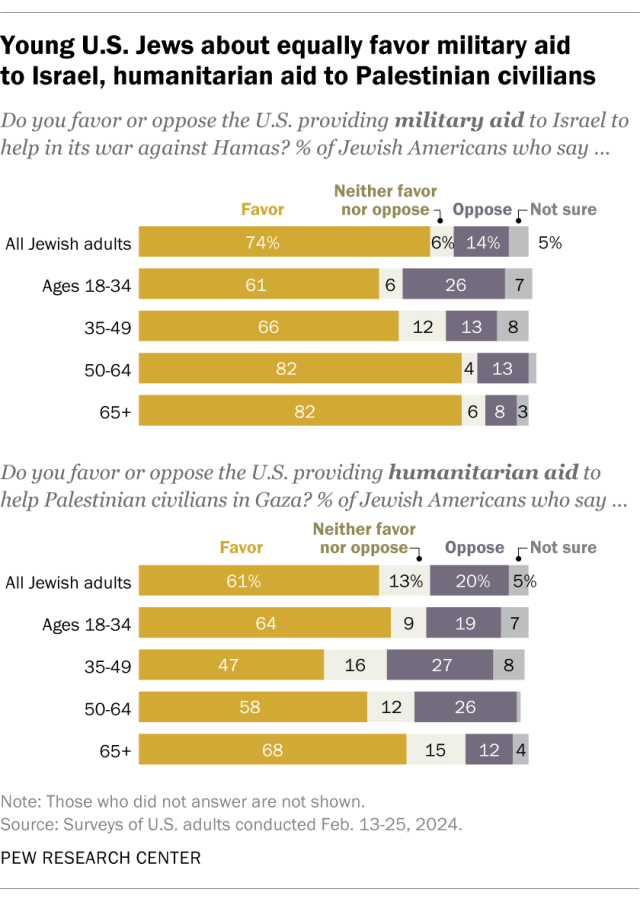
Most American Jews say the U.S. should play at least a minor role in diplomatically resolving the Israel-Hamas war. Majorities also favor providing military aid to Israel (74%) and humanitarian aid to Palestinian civilians in Gaza (61%). On all these questions, Jews tend to be more likely than U.S. adults as a whole to favor U.S. involvement.
Older Jews are more likely than their younger counterparts to say the U.S. should play a major diplomatic role in resolving the war: 54% of Jewish Americans ages 65 and older say this, compared with 33% of those ages 18 to 34. Older Jews are also more likely to favor the U.S. providing military aid to Israel to help in its war against Hamas (82% of those 50 and older vs. 61% of those 18 to 34).
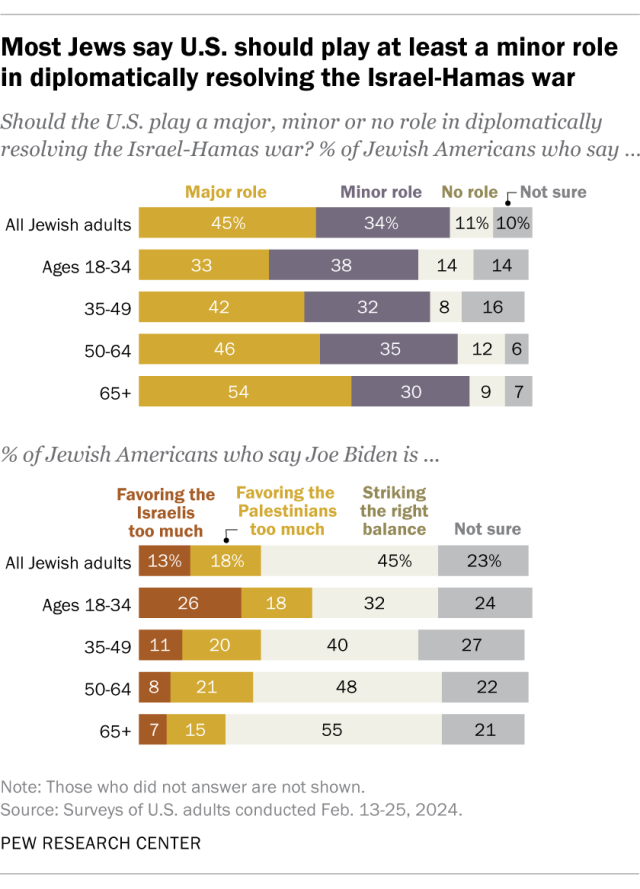
When it comes to how U.S. President Joe Biden is handling the conflict, relatively few Jewish adults under 50 (35%) say he is striking the right balance between Israelis and Palestinians. By comparison, 53% of Jews ages 50 and older say Biden is striking the right balance.
Discrimination, taking personal offense at speech or news about the Israel-Hamas war
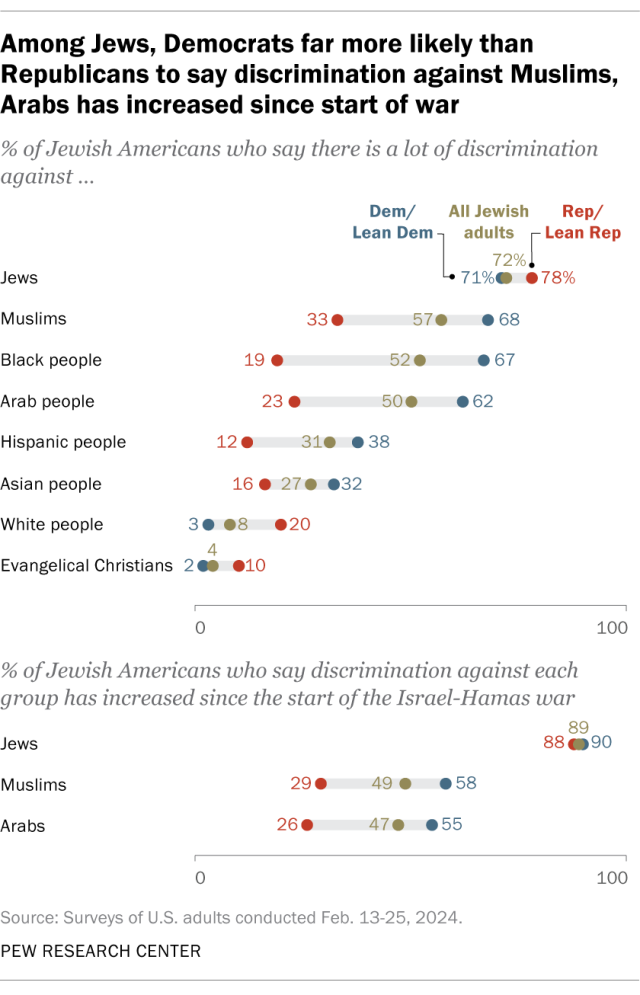
An overwhelming majority of Jewish Americans (94%) say there is at least some discrimination against Jews in America, including 72% who say there is a lot. Among Americans overall, a large majority (82%) also perceive at least some discrimination against American Jews.
Jewish Republicans and Democrats tend to perceive discrimination differently. Jewish Republicans are far less likely than Jewish Democrats to say that some groups – such as Muslims, Black people or Arab people – face a lot of discrimination in the U.S. today. Jewish Republicans are also far less likely than Jewish Democrats to say discrimination against Muslims and Arabs has increased since the start of the Israel-Hamas war.
Meanwhile, about three-quarters of U.S. Jews (74%) say they have felt offended because of something they saw on the news or social media about the Israel-Hamas war, and half have been offended by something someone has said around them about the war. A quarter say they have stopped talking to someone in person – or unfollowed or blocked someone online – because of that person’s comments about the conflict. Jews are far more likely than the U.S. public overall to say they have felt offended or stopped talking with someone under these circumstances.
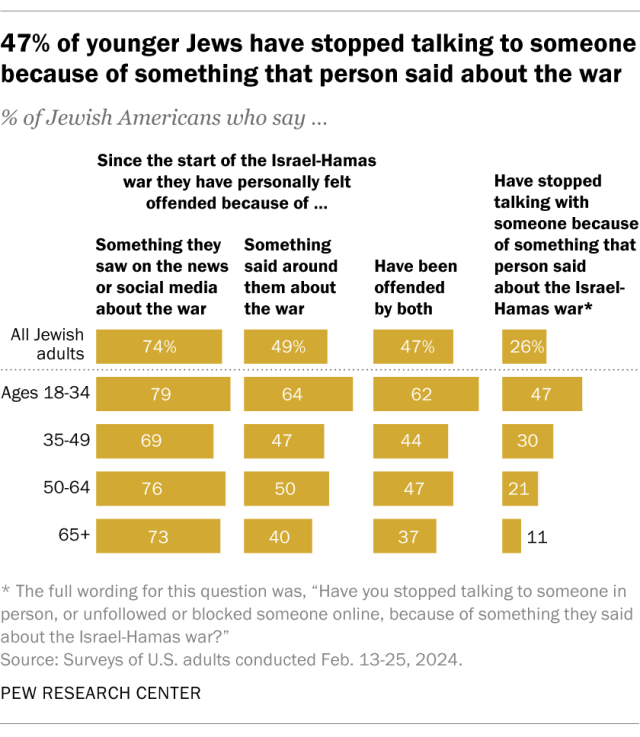
Younger Jews are especially likely to say they have felt offended, both by something they saw on social media or by something that was said around them. Six-in-ten Jewish Americans ages 18 to 34 say they have been offended by both (62%), while half or fewer among older age groups say the same.
Similarly, 47% of Jewish adults under the age of 35 say they have stopped talking to someone in person or online because of something that person said about the war. Jews ages 65 and older are the least likely to have done this (11%).